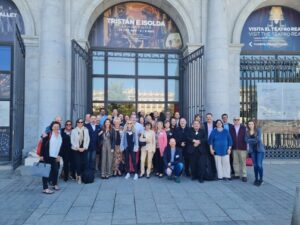OMAI Spring & Conference Newsletter (June 2023)
Download pdf: OMAI Spring & Conference Newsletter 2023
Dear Colleagues, June 2023
As another busy season comes to a close I am looking forward to summer festivals, time with family and friends, and reflection on all that is good in our lives and our profession. I want to take this time to thank all of my colleagues at
OMAI for their dedication, work, and friendship. It is rare to find a group of individuals that come together for the common good of an entire profession and certainly the example we have set at OMAI is one we can all be proud of.
Accomplishments this season are numerous and at the top of the list is the hiring of our new Managing Director, Zenaida des Aubris. Zenaida’s achievements in the opera profession are many and she has quickly become an integral member of our association.
Certainly at the top of the list of accomplishments we owe a huge debt of gratitude to our colleague Marc Mazy and the entire Conference Committee for setting up what was a wonderful conference in Madrid. It was one of the most enjoyable weeks of the year for me and informative on many levels. Congratulations also go out to Tali Calderon leading the newly formatted open Opera Committee meetings. I found the meetings insightful and the discussions engaging as we continue to discuss the ongoing issues we face as managers.

As we look to the future, I am happy to announce that in the fall I will be forming the OMAI Business Committee. This committee will assist me as your president in the ongoing discussions with our fellow associations IAMA, AEAA, DOKA, ARIACS, AFAA, and the many singers associations. It is through this committee that we will continue ourwork with Opera Europa to create better working relationships between managers and houses. The expanded committee will also deal with issues such as commissions, artist transfers, and business structures for the modern manager.
Finally, I want to thank our Communications Committee. Without their dedication and insights none of the work we do as an association would be available to our members. So, a huge thank you to Markus, Sarah, Robin, Marc, and Marie-Catherine.
I will see all of you in a few months. In the meantime, I look forward to seeing highlights of your summer travels on the OMAI Members Social Group on WhatsApp.
Mitchell Piper, President
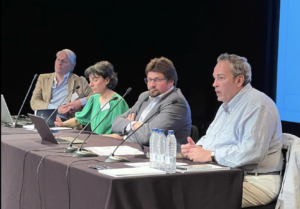
OMAI 2nd Annual Conference, Madrid, April 19-21, 2023
The most significant step taken in planning the OMAI conference in Madrid was to invite representatives of the European singers’ associations. Since our founding, our goal has been to have a seat on the table. Often opera managers are not seen as equal partners in decisions on the future of the opera business. After our successful and important discussions with Opera Europa in Berlin, it was now time to have the singers on board.
Professional Practices: Agents & LyriCoalition
This was an open dialogue session – for the first time with singers – in which we exchanged our viewpoints, and sometimes very different viewpoints. We discussed how cooperative agreements between managers and singers could be structured, what services should be offered to the artists and what payment structures (commissions) are to be expected. We all agreed, these were important first steps in getting to know each other and look forward to talking more.
Carlos Álvarez, Secretary of Institutional Relationships of ALE, comments: “The OMAI meeting in Madrid served, fundamentally, to stage the need for understanding and close collaboration between the professionals who
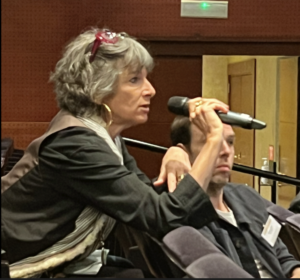
participate in the lyrical activity, establishing, from that moment, the obligation of a better and deeper knowledge of the needs and aspirations of each of the sectors involved in it.”
And Nicola Beller Carbone from krea[K]tiv adds: “During OMAI / Madrid we realised that the constructive dialogue and solidarity between agents and artists has set an important symbol and it became tangible for all that we undoubtedly belong together. In any partnership, transparency, respect and fair play are the basis for successful development. We believe that the willingness of both players to listen sets the basis for a future in which agreements are worked out and kept together.”
Spanish Musical Institutions
 One of the highlights of our conference in Madrid was the opportunity to learn more about the current situation of classical music in Spain with a panel of high-level participants. We were able to share many impressions and valuable information. It was full of insights and very useful. We feel certain that this was the starting point dedicating cooperation between Spanish opera associations. Only by pulling in the same direction we can become stronger. We would like to express our gratitude to:
One of the highlights of our conference in Madrid was the opportunity to learn more about the current situation of classical music in Spain with a panel of high-level participants. We were able to share many impressions and valuable information. It was full of insights and very useful. We feel certain that this was the starting point dedicating cooperation between Spanish opera associations. Only by pulling in the same direction we can become stronger. We would like to express our gratitude to:
Nieves Pascual | General Coordinator of Ópera XXI (Association of Spanish Opera Theaters)
Andrés Lacasa | AEOS President (Assoc. of Spanish Orchestras), Intendant of Orquesta Sinfónica de Galicia, Aquiles Machado | Artistic Director of Opera Festival at La Coruña, José María Marco | Madrid Correspondent for Ópera Actual, the only magazine dedicated exclusively to opera in Spanish, Francesca Calero | ALE (Syndicate of Lyric Artists of Spain), José Miguel Pérez-Sierra | Conductor
Opera Europa & LyriCoalition
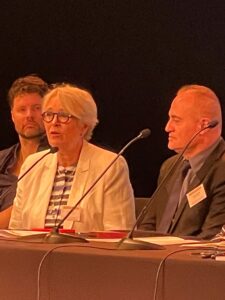 A panel of Opera Europa members came to Madrid to participate in our 2nd open conversation between opera managers and the continuation of the Berlin protocols achieved last year. We invited the singers’ associations to join us in what was a lively and productive discussion addressing many of the main issues confronting our business today.
A panel of Opera Europa members came to Madrid to participate in our 2nd open conversation between opera managers and the continuation of the Berlin protocols achieved last year. We invited the singers’ associations to join us in what was a lively and productive discussion addressing many of the main issues confronting our business today.
This first-time dialogue with producers, managers and singers in the same room is necessary to bring awareness to the different sides of the issues important to all of us. We are encouraged by this and plan to continue these conversations in the newly formed OMAI Business Committee to seek common ground and move the needle forward.
We thank the panelists, led by new OE President Karen Stone, Joan Matabosch/Teatro Real Madrid, Josef Fuchs/Reisopera Enschede, Laura Canning/Opera North Leeds and Boris Ignatov/Staatsoper Stuttgart and the singers’ representatives of the LyriCoalition: Tijl Favets, Nicola Beller Carbone, Martina Bortolotti von Haderburg and Carlos Álvarez for their active and valuable participation.
Operabook
Special guest at the 2023 OMAI conference was Dr. Susan Werger, the Membership and Services Manager of Operabook. She gave an informative overview of Operabook and answered many of our questions. Operabook was developed as a response to the need expressed by Opera Europa members for an independent and objective search tool. It gathers data from over 350 opera companies worldwide. The developers were able to devise a cutting edge, user friendly, professional tool that serves Operabook members. It is a multi-database Operabook platform which hosts historic production and casting information since the 2011-2012 season with performance dates and casts. At the OMAI conference, we discussed changes in their platform to make it more user friendly, and to allow more information without logging in, including adding management contacts.
Along with OMAI, Operabook is endorsed by and is the preferred service of Opera Europa, IAMA, AFAA, AEAA , Ariacs and CMA (Classical Music Artists).
Operabook: https://operabook.org/en/about
OMAI Talks
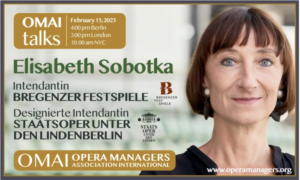 On February 15, 2023 Elisabeth Sobotka, incoming Intendantin at the Staatsoper Unter den Linden Berlin, was our guest for our 10th OMAI Talk. She gave an engaging talk on her vision of the need to make programming changes and use more effective marketing tools to attract new and younger audiences to the opera. Sarah Stephens has made another video summarizing this productive conversation with our members.
On February 15, 2023 Elisabeth Sobotka, incoming Intendantin at the Staatsoper Unter den Linden Berlin, was our guest for our 10th OMAI Talk. She gave an engaging talk on her vision of the need to make programming changes and use more effective marketing tools to attract new and younger audiences to the opera. Sarah Stephens has made another video summarizing this productive conversation with our members.
OMAI Talks-10 Elisabeth Sobotka speaks with Opera Managers: https://www.youtube.com/watch?v=4jVt4HYi7f0
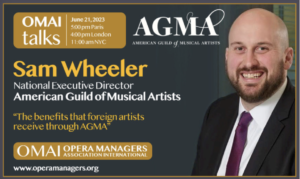
On June 21, 2023 our special guest Sam Wheeler, AGMA National Executive Director, spoke with opera managers for an OMAI One-Off Talk. The focus was on non-resident foreign artists and the benefits they also receive when performing in the US. Many other important issues were also addressed such as membership conditions and fees, the status of Young Artists and more.
We were joined by other association leaders and non-member managers for this talk. A trailer will be available soon. Please check our OMAI YouTube Channel for more videos.
Membership
The Board and the Membership Committee of OMAI (Samuel Krum, Membership Chair and Treasurer) is beyond thrilled to welcome those agencies joining our organisation so far this year:
Stellis Polaris Management (Oslo, Norway), Mark Kendall Artists Management (Hargrave, UK), Eliasson Artists (Stockholm, Sweden), Arien Artists (Gent, Belgium)
The strength of an organisation such as ours comes from our collective expertise and perspective on the industry, and with each new member that extraordinary knowledge and understand grows even stronger. We welcome these new members and look forward to hearing from them and seeing them at our future meetings and conferences.
Next OMAI Conference in Stockholm, May 2024
We are delighted to announce the 3rd OMAI Annual Conference to take place in Stockholm in May of 2024. We are excited to join our colleagues in the Scandinavian countries and learn more about their practices. More details will follow. Mark your calendars!
Sarah has made a trailer of the Madrid conference. Have a look. We hope it inspires you to join us – again or for the first time – at the conference in Stockholm!
OMAI 2nd Annual Conference Trailer Madrid: https://www.youtube.com/watch?v=RH2vUVlCvGY
We are very proud of our accomplishments since founding OMAI in October 2020. We continue to grow and expand our important conversations with other organizations and amongst ourselves. We are making a difference in our profession. Thank you for your membership and participation to make this possible. Only together can we make things better!
Hope to see you all in Stockholm in 2024!
Yours,
Markus Laska & Sarah Stephens
And the Communications Committee
operamanagers.org, Instagram: https://www.instagram.com/operamanagers / Facebook: Opera Managers International



OMAI Talks Videos
OMAI Talks 10th conversation on 20 February 2023
Elisabeth Sobotka | Incoming Intendantin, Staatsoper Berlin, speaks with opera managers
OMAI Talks 9th conversation on December 1, 2022
Casting after the Pandemic: Artistic directors speak with opera managers
Isla Mundell Perkins | Staatsoper Hamburg Erik Malmquist | Bayerische Staatsoper Munich Michael Barobeck | Oper Graz
OMAI Talks 8th conversation on 15 February 2022
Vocal Education & the Opera Business moderated by Sarah Stephens
Sarah Wedl-Wilson | President, Hochschule für Musik Hanns-Eisler Berlin, Christopher Rochester | Director, Global Music Initiative, MacPhail Minneapolis, Émilie Delorme | President, Conservatoire National Supérieur Paris, Melissa Wegner | Executive Director, Lindemann Program & Laffront Competition, Metropolitan Opera New York
OMAI Talks 7th conversation on December 1, 2021
Alexander Neef | Director, Paris Opera speaks with Opera Managers Assocation, moderated by Markus Laska
OMAI Talks 6th conversation on March 24, 2021
Young Artists Programs
Rosemary Joshua | Dutch National Opera Studio Amsterdam Michael Heaston | Metropolitan Opera New York Thomas Barthel | Internationales Opernstudio Opernhaus Zürich
OMAI Talks 5th conversation on February 25, 2021
Birgitta Svendén | Managing & Artistic Director, Royal Swedish Opera Mariusz Kwiecień | Artistic Director, Opera Wroclaw, Poland
OMAI Talks 4th conversation on February 15, 2021
Audrey Jungers | General Manager, Opera Europa Marc A. Scorca | President, Opera America
OMAI Talks 3rd conversation on January 28, 2021
Christoph Seuferle | Operndirektor, Deutsche Oper Berlin
OMAI Talks 2nd conversation on January 21, 2021
Peter de Caluwe | General & Artistic Director, Théâtre Royal de la Monnaie
OMAI Talks 1st conversation on December 15, 2020
Christina Scheppelmann | General Director, Seattle Opera
Introducing OMAI Series
Introducing OMAI-1: Sarah Stephens in conversation with Mitchell Piper & Markus Laska on 28 November 2020
Introducing OMAI-2: Sarah Stephens in conversation with Natalia Neumann & Marc Mazy
Introducing OMAI-4: Sarah Stephens in conversation with Christopher Carroll, Jeffrey Larson and Sam Krum (Part 1)
Introducing OMAI-5: Sarah Stephens in conversation with Christopher Carroll, Jeffrey Larson and Sam Krum (Part 2)
______________________
OMAI Open Letter: Addressing the Covid-19 crisis after one year (March 2021)
Solutions Needed for the Global Culture Drain
Countries around the globe that provide public support for freelance artists in the performing arts will recover faster and a more vibrant post-pandemic culture.
The month of February marked the first anniversary of the La Scala opera house in Milan, Italy, one of the world’s greatest cultural and historic icons, shutting down due to the Covid- 19 pandemic. Within weeks of La Scala closing, almost all opera and concert halls around the globe were shuttered, including New York’s Metropolitan Opera. One year later, 90% of theaters are still closed to the public and plans to reopen are undetermined.
The pandemic shutdown has been devastating on opera and the arts industry. In the U.S., the arts contribute $763.6 billion to the US economy – 4.2 percent of the GDP (US Bureau of Economic Analysis – March 8, 2019). The performing arts sector, which includes orchestra musicians, coaches, dancers, stage directors, and designers, has been out of work for an entire year. While opera houses and artists are producing streamed performances, they cannot replicate the live experience for the audience or provide a living wage for the artists.
Can the industry survive this? Opera has existed for over 450 years and has survived many global crises. But what the future will look like when the curtains reopen is uncertain.
Opera Managers Association International (OMAI) was founded to address these questions. We are concerned about the welfare of the artists we represent and the viability of the profession and industry that we so passionately care about.
In countries where public support for the arts is provided, artists are doing better. In Germany, artists employed by opera houses receive support through a social insurance program known as Kurzarbeit. Health insurance is compulsory and covers everyone living in Germany. The chorus at the Deutsche Oper Berlin, for example, while unable to perform, is still receiving full salary and health insurance benefits.
In the U.S., where the arts are funded primarily through ticket sales and private donations, virtually no social safety net was in place when the pandemic hit. Singers work either as self- employed freelance artists or with union contracts when employed in the major houses.
It came as a shock when the Metropolitan Opera in New York invoked force majeure clauses cancelling freelance artist contracts and laying off the union musicians. Due to lack of a safety net in the U.S., these artists were left with no income and in many cases no unemployment benefits or health insurance. Columbia Artists Management, the famed international talent management agency for over 90 years that represented legendary classical artists such as Leontyne Price, Vladimir Horowitz and Herbert von Karajan, soon followed by shutting down amid the “prolonged pandemic environment”. Stop gap measures such as the CARES Act and the SOS (Save our Stages) Act have provided some relief, but with only a fraction of usual income and no long-term security. Today we represent approximately 35% of opera managers internationally and cooperate closely with professional organizations as well as major actors in the industry.
Freelance artists who sing the lead roles on the world’s stages often do not qualify for support. They perform in theaters in many different countries, leaving them uncovered by social security systems in any country. These artists are tragically falling through the cracks.
Particularly heartbreaking is the situation for the younger generation. Many emerging artists are leaving the field before even getting started. They simply can’t afford risking an uncertain career in the profession, especially if burdened by student debt from American universities.
A worrisome culture drain is underway that needs to be recognized and addressed. With hope for their futures dwindling, many opera talents are permanently leaving the field.
Countries that value opera and the performing arts as a vital part of a vibrant, cultural community must consider the long-term effect of shutting down an entire sector for what may be years. While we advocate for reopening when it’s safe, we also want our governments to address the financial hardships this pandemic has caused those in the arts at every level. A consequential first step in the U.S. would be the appointment of a cabinet level position dedicated to arts and culture.
Are we willing to finally provide greater stability and resiliency in the form of a better safety net world-wide? Opera and the performing arts are a global industry, and we are advocating for global solutions. We must act now before the damage already inflicted becomes even worse.

Mitchell Piper, President of OMAI
Opera Managers Association International
Mitchell Piper is President of OMAI. He is the Executive Director of the Trentino Music Festival and Piper Artists Management.
OMAI Board of Directors
- Mitchell Piper, President
- Dari Dimova, Vice President
- Sarah Stephens, Secretary (Op-Ed author)
- Markus Laska, Communications Director
- Marcus Carl, Treasurer
________________


